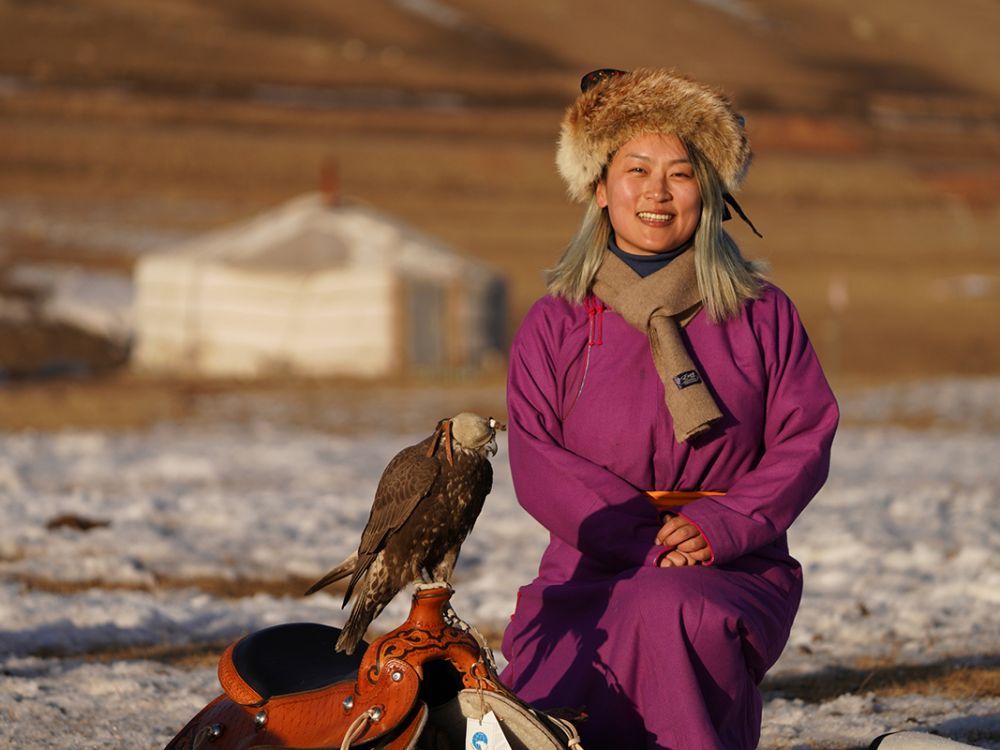By Libby Riddle, UM News Service
MISSOULA – Growing up in Daegu, the fourth-largest city in South Korea, Nari Lee dreamed of exploring true wilderness. Her urbanized environment left her with little opportunity for outdoor experiences.
For years she was pulled in many directions, forced to choose between her career, her commitment to social justice and her growing concern for Earth’s biodiversity. Now a graduate student in the Environmental Studies program at the 91次元, Lee can explore all her passions at once.
Her path to UM was neither straight nor easy. Trilingual, with a bachelor’s degree in culture and art, Lee spent several years working to support the arts in her hometown. By the time she turned 30, she had secured a stable job with a pension in her local government. But it wasn’t enough for her.
“I was so tired of working in the office,” Lee said. “I was eager to expand my career to the conservation field.”
Lee quit her job and moved to a remote region of Mongolia near the Gobi Desert, where she worked closely with climate migrants – people displaced from their homes by the effects of climate change. This region suffers from desertification, a process in which farmland rapidly becomes desert-like and infertile. She worked with the to plant trees that protect people and their livestock from sandstorms and create alternative economies for those who lost their livelihoods.
“I lived with Indigenous communities, and we didn’t have any languages in common, but it didn’t matter,” Lee said. “We had shared goals and experiences as human beings.”
Lee credits her time in Mongolia with showing her the importance of international work in conservation. She learned that Mongolia’s sandstorms resulted in dangerous air conditions all the way back home in South Korea, creating a shared air community between the two countries.
Mongolia and South Korea also share many migrating species. Lee assisted with research on whooper swans and white-naped cranes, which breed in Mongolia and travel south to the Korean peninsula for winter.
“One really fascinating part of that research was that I lived with many foreign researchers from 15 different countries,” Lee said. “We shared our knowledge and conservation insights, our struggles and our toughest research conditions. I had a really good time connecting with all the folks from such different places around the world.”
One of these foreign researchers was a conservation psychologist from the United States. Lee confided in him that she wanted to expand the scope of her conservation experience and incorporate advocacy and social justice.
“I was an environmental activist in South Korea, but the idea of intersecting science and social science is pretty rare there,” Lee said.
Lee and the American conservation psychologist began dating, and he introduced her to environmental studies, a field that incorporates multiple disciplines such as social science, which she could study in the U.S. Now married, the two moved to Montana so Lee could attend UM.
“I feel like UM is the perfect fit where I can pursue all my passions,” Lee said. “I may seem scattered in all these different areas, but here it’s more flexible for me to do that.”
In addition to a master’s degree in environmental studies, Lee will complete a minor in gender and sexuality studies and a certificate in international development studies. She will use her expertise in these subjects to co-teach a course in global feminism this fall for UM’s Franke Global Leadership Initiative.
Lee’s experiences as a female conservationist and activist inspired her to center her research around gender barriers in conservation in Mongolia and her home country of South Korea. In each country she’s worked in, her work environment was heavily male dominated. Without other female researchers, she felt isolated, disconnected and even unsafe at times.
“I had the chance to give some presentations about my work back home in Korea,” Lee recalled. “One day, I went to the lecture room and the first thing the organizer said to me was ‘Oh, I thought you were a man.’ And that kind of thing has happened a lot in my life.”
Lee spoke with female researchers and conservationists who shared similar experiences. They mentioned that in field research settings, duties like cooking and cleaning often defaulted to them due to unspoken assumptions by their male peers.
“It was so sad to me to see those gendered norms even in highly academic settings,” Lee said. “There were very few women in leadership among conservationists in Mongolia. It’s a small community, which makes it hard to speak out.”
Though there is very little existing research on gender barriers in conservation, Lee’s initial work has already inspired several former colleagues to speak out about their experiences.
“I’m so touched by those who have shared their experiences so publicly,” Lee said. “I’m observing the changes right now, seeing female conservationists speak out who haven’t been able to talk about their challenges before. It’s so meaningful for me to see that my research can really help people.”
Lee hopes to return to Mongolia after she completes her degree at UM, where she can start to implement changes based on her work. But it’s not just her passion for her work that calls her back.
“Montana reminds me so much of Mongolia,” Lee said. “Everything is so similar – the open grasslands, even the cowboy hats.”
Lee will add her experience in Montana to her growing repertoire of international conservation work. From South Korea to Mongolia to Montana, Lee advocates for diverse perspectives and equal treatment in conservation wherever she goes.
“Because that’s our goal, right? Biodiversity. To diversify the environment and make it more colorful,” she said. “So we can do that in our communities, in our cohorts and our classrooms.”
###
Contact: Elizabeth Harrison, Director of Communications, W.A. Franke College of Forestry and Conservation, 917-656-9773, elizabeth.harrison@mso.umt.edu.
